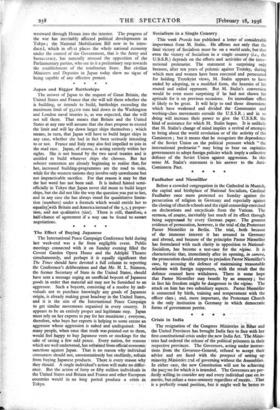The Effect of Buying Japanese The International Peace Campaign Conference
held during last week-end was a far from negligible event. Public meetings connected with it on Sunday evening filled the Covent Garden Opera House and the Adelphi Theatre simultaneously, and perhaps it is equally significant that The Times should have devoted a full column to reporting the Conference's deliberations and that Mr. H. L. Stimson, the former Secretary of State in the United States, should have sent a message urging an unofficial boycott of Japanese goods in order that material aid may not be furnished to an aggressor. Such a boycott, consisting of a resolve by indi- viduals not to purchase knowingly any goods of Japanese Origin, is already making great headway in the United States, and it is the aim of the International Peace Campaign to get similar movements organised in every country. It appears to be an entirely proper and legitimate step. Japan must rely on her exports to pay for her munitions ; everyone, therefore, who buys her exports is helping to some extent an aggressor whose aggression is naked and undisguised. Not many people, when once that truth was pointed out to them, would feel happy to buy Japanese vests or stockings for the sake of saving a few odd pence. Every nation, for reasons which are well understood, has refrained from official economic sanctions against Japan. That is no reason why individual consumers should not, unostentatiously but stedfastly,-refrain from buying Japanese products. There is every reason why they should. A single individual's action will make no differ- ence. But the action of forty or fifty million individuals in the United States and Britain and France and other European countries would in no long period produce a crisis in Tokyo.










































 Previous page
Previous page